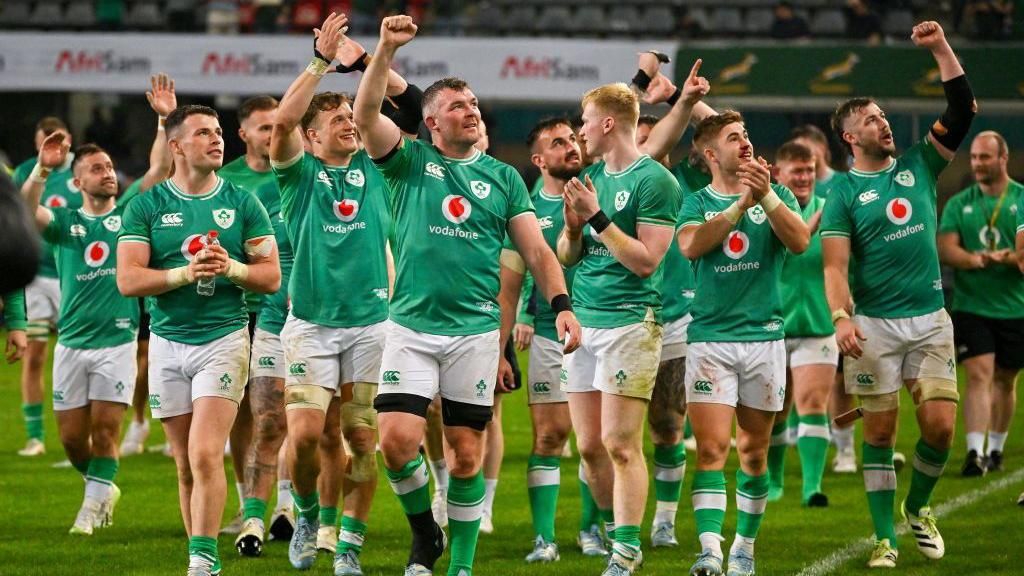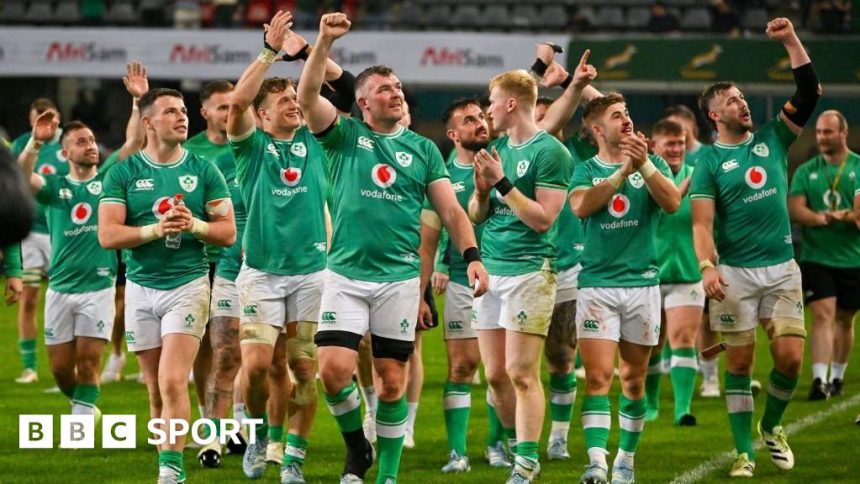‘Ireland close one chapter and ready to open another’

Ireland secured a series split with the Springboks thanks to Ciaran Frawley’s late drop-goal in Durban
-
Published
While the looming landmark will not have played much on Andy Farrell’s mind last week as he devised the gameplan to secure a series split in South Africa, it is hard not to view his 50th game in charge of Ireland as something of a demarcation point in his tenure.
Win, lose, or draw the second Test against the Springboks in Durban on Saturday, there was always going to be a sense that the end of this anticipated tour would mark the beginning of the next chapter.
And while Farrell’s 40th victory across that half century of games atop the ticket gives him the best winning percentage of any Irish coach in history, even greater than his predecessor Joe Schmidt, there is still a feeling of change in the air.
Despite the largely successful outcome of a drawn series despite a first Test defeat, events in South Africa over the past two weeks have strengthened, not weakened, that theory.
Forgotten growing pains
Given they are back-to-back Six Nations champions, and Farrell has been rewarded with the Lions coaching job for next summer’s tour to Australia, it is easy to overlook the rocky beginning to his Ireland tenure.
When the Englishman, who had been the side’s defensive specialist since 2016, took on the job from his former boss Schmidt after the 2019 World Cup, there was no abrupt attempt to reinvent the wheel.
Skipper Rory Best had stepped away after that quarter-final loss to New Zealand, while there was also the need to replace long-serving full-back Rob Kearney. But it was to be a case of evolution not revolution, even if the lack of immediate improvement in results meant Farrell copped criticism now long since swept under the carpet.
While others thought best to immediately move from one four-year World Cup cycle to the next, Farrell stuck with the majority of Schmidt’s side, bringing in new players gradually.
Caelan Doris and Ronan Kelleher would debut in his first window, Jamison Gibson-Park, James Lowe and Hugo Keenan the next.
It would be more than a year in the job before we saw the likes of Craig Casey and Ryan Baird, with Dan Sheehan and Mack Hansen sprinkled in thereafter.
Joe McCarthy has become an increasingly important figure for Ireland
Last year, following another quarter-final exit to the All Blacks, Farrell again did not see a disappointing World Cup as cause to rip it up and start again.
In recent times, though, there has felt like something of a more rapid changing of the guard.
Joe McCarthy displaced Iain Henderson and James Ryan from teams over in France and carried that form through the 2024 Six Nations.
Uncapped Jamie Osborne was handed a debut in the first Test defeat to South Africa while it felt significant that, in the absence of Gibson-Park, it was Craig Casey and not Conor Murray who got the nod to start in Pretoria.
For the IRFU to reveal last week that provinces will soon be restricted from importing props felt like a tacit acknowledgement that the likes of Tadhg Furlong and Cian Healy will not be around forever either.
In the months ahead, Farrell will also see the biggest change to his coaching ticket since Paul O’Connell came on board in 2021 with the void left by Mike Catt’s departure as attack specialist to be filled by Leinster’s Andrew Goodman.
Perhaps the biggest harbinger of change, however, was Farrell’s selection call last Thursday.
Never shy of a bold decision – it is forgotten now how the likes of Gibson-Park and Hansen were viewed as somewhat left-field choices at the time of their first starts – to drop his 34-year-old captain Peter O’Mahony to the bench for the second Test made a huge statement.
It all points to a team with one eye on the here and now but another on the future.
Attack specialist Mike Catt will leave Farrell’s coaching ticket after this tour
Opportunities to develop
These two games against the back-to-back world champions always felt like one last push from the same group that took Ireland to a 2023 Grand Slam and the number one ranking in the world this time last year.
With a sure-to-be eagerly anticipated autumn meeting with the All Blacks in Dublin as their next fixture, and England emerging as a sizeable threat to their recent Six Nations supremacy, Farrell is not about to start experimenting for experimentation’s sake.
But it will be fascinating to see if the baton of Ireland’s spiritual leader is permanently passed from O’Mahony to Doris for November, while Ciaran Frawley has clearly staked a claim to push Jack Crowley for the number 10 jersey, even if it is one he rarely wears for his province Leinster.
Uncapped players like Sam Prendergast, Cormac Izuchukwu and Nathan Doak, who travelled to South Africa without seeing the pitch, will look to kick on too, even if it could be next summer before they see significant time in green.
Exact fixtures are still being finalised but the side will be heading for Georgia and Romania next July, matches that would lend themselves to a deepening of the talent pool akin to when Japan and USA came to Dublin in 2021.
Farrell himself will be otherwise engaged by then, of course, as he leads the Lions in Australia with his assistant Simon Easterby expected to take temporary charge.
Change is coming for Ireland next season. After ending their longest campaign on such a high in Durban, they look ready to embrace it.





